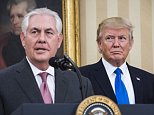Tortured, starved and locked up in the dark... heroic British doctor held by Assad's thugs
- Dr Abbas Khan, from South London, vanished on a mercy mission to Syria
- Tracked down by distraught mother Fatima who travelled to Damascus
- 'He was like a skeleton and could barely walk,' she says

'Forgotten': Dr Abbas Khan, pictured with son Abdullah, disappeared a year ago on a humanitarian mission to Syria
A British doctor who disappeared a year ago on a humanitarian mission to Syria has been tortured in a notorious military prison - and was only found after his mother spent months in the war-torn country trying to locate him.
Dr Abbas Khan, 31, an orthopaedic surgeon, was systematically beaten by interrogators and held for eight months in darkness in an underground cell.
At one point his weight dropped to just under five stone.
Married with two young children – six year-old son Abdullah and daughter Rurayya, seven – he was arrested on November 22 after crossing the Syrian border without a visa and treating wounded civilians in a field hospital in a rebel-held district of Aleppo.
For months his fate remained unclear, his plight seemingly forgotten, but his mother succeeded where diplomats and politicians failed, and managed to track him down after travelling to Damascus alone.
Speaking from the Syrian capital on her mobile phone, Fatima Khan said: ‘He was like a skeleton and could barely walk.
‘He told me that he had been through eight months of hell and at times had simply wanted to die. He was getting trouble from both sides.
'As well as the guards, other prisoners turned on him just because he is British. He told them that he was there to help their mothers and children.’
Mrs Khan, 57, from Mitcham, South-West London, arrived in Damascus in July and has remained there, on her own, ever since, vowing not to return to Britain until her son is released.

Search: He was tracked down by his mother Fatima and is now being held at Adra Prison in Damascus
Demonstrating unshakeable determination and driven by what she calls ‘a mother’s love’, she persuaded officials to transfer Dr Khan from Far’ Falastin detention centre just outside Damascus to another jail.
He is now being well treated and she is able to visit him once a week.
‘When I first saw him he was in tears and hugged me,’ she said. ‘He was saying, “Please Mum, please take me home.” ’
Mrs Khan is reluctant to discuss her son’s incarceration in Far’ Falastin in any depth for fear of inflaming an already highly fraught situation.
But Amnesty International UK director Kate Allen said yesterday: ‘Conditions in Far’ Falastin have been notorious for years, with detainees often squeezed into rat and lice-infested underground cells known as “tombs” by the guards.
‘The CIA used to send people there as part of its infamous rendition programme. Torture is commonplace. It’s the last place you’d want to end up if you were caught by the authorities in Syria.’

Close: Dr Khan, from Stretham, South London, right, in teenage years with his mother and brother Afroze
Back in Britain, Mrs Khan’s other two sons and two daughters have worked ceaselessly behind the scenes to try to secure their brother’s release.
One of the politicians they sought help from was Shadow Justice Secretary Sadiq Khan, who went to the same school as Dr Khan in Tooting, South-West London.
‘The bravery and determination of Dr Khan’s mother, who has been in Syria searching for her son these last four months, is incredibly moving,’ said the MP.
‘It is a huge relief that she has found her son alive but questions must be raised as to why this couldn’t have been achieved by our Government.
‘I hope the Government will now make a renewed effort to use all diplomatic options available to secure Dr Khan’s release. I will also be raising this matter with the Foreign Secretary again.’
The Foreign Office has no consular relations with Syria, and this has severely impeded its efforts to make progress through diplomatic channels.
Syrian Ministry of Justice officials in Damascus have told Mrs Khan that her son was detained because he entered the country illegally and helped treat wounded rebels. But he has not been formally charged.
‘The case is in the hands of a judge, but I have heard that so many times before,’ said Mrs Khan.
‘My wonderful son is an innocent humanitarian worker who risked his life to help others. That is all he ever wanted to do. He is not in any way political; he is a doctor.
‘There must be someone who can help bring him home.’
Dr Khan, from Streatham, South London, is a hand/nerve trauma surgeon.
He spent a year as a training surgical registrar in Carlisle under consultant orthopaedic surgeon Rami Hussein and worked at the Royal National Orthopaedic Hospital in Stanmore, Middlesex.
In a letter to the Syrian authorities, Mr Hussein said: ‘I got to know Dr Khan very well as a colleague as well as a friend. I found him to be an excellent and caring medical colleague at all times. I can completely vouch for his professional and personal integrity.’
Dr Khan, who was on a six-month sabbatical from Epsom and St Helier University Hospitals NHS Trust, arrived in Turkey on November 12.
Initially working alongside the UK charity Human Aid, he spent the first week treating injured refugees crossing the border.
From them he heard stories of children dying on the streets of Aleppo, then the scene of some of the civil war’s worst fighting, because of a dire shortage of medics.

Innocents: A youth holds a child wounded by the Syrian Army shelling near Dar al-Shifa hospital in Aleppo
Along with two other doctors he decided to cross independently into Syria on November 20.
Unknown to Dr Khan, who brought medical supplies from home, he was entering the country at a time when anti-British sentiment in the Syrian government was running high.
That same day, William Hague angered President Assad and his high command by formally announcing a switch of recognition from Damascus to the newly formed Syrian National Coalition, which he called the ‘sole legitimate representative’ of the country’s people.
According to his family, Dr Khan spent just 24 hours working at a field hospital in Aleppo, helping only women and children, before being arrested by security forces at a checkpoint on November 22.
He was due to fly home two days later.
At first he was taken to an air force base before being transferred to Far’ Falastin.
His family heard through unofficial channels that he had been detained, but beyond that nothing more.

Notorious: Amnesty International UK director Kate Allen said Far' Falastin detainees are often squeezed into rat and lice-infested cells known as 'tombs'
‘We were frantic,’ said his mother. ‘By March I decided that I couldn’t just sit at home doing nothing – I would have to go to Damascus to try to find him.’
Leaving her husband at home as she believed men are more likely to be arrested in Syria, Fatima went with her 23-year-old daughter Sara, a biomedical science student.
They first went to Beirut in Lebanon to try to obtain a visa for Syria but they were unsuccessful and returned home after several days.
Three months later she received unexpected news: her application had been approved.
‘There was a visa for me but not my daughter. I thought it would be better if I went alone, and as a mother I thought I would be better placed to plead my son’s case.’
Sara said the family failed to persuade her not to go. ‘She was just so determined. It is amazing because she has never been abroad alone before. We are enormously proud of her.’
After checking in to the Sheraton Hotel in Damascus, Mrs Khan headed immediately to the Foreign Affairs Ministry, where she endured ‘endless lectures about why Britain was a bad country’.
‘One official I met was really quite angry with me. But I told him that I know nothing of Britain’s policies. My life is about cooking and looking after my family.’
Undeterred, she lobbied officials for days on end, sometimes waiting hours for meetings lasting barely a few minutes.
And she handed over hundreds of pounds to unscrupulous lawyers who made ‘false promises’.
One said he could help if she gave £3,000 to him and £3,000 to a judge.
‘By then I was aware that they were trying to trick me and I reported this man,’ said Mrs Khan.
Eventually, however, she found a sympathetic Ministry of Justice official. ‘He was phoning everywhere and told me to give him 48 hours,’ said Mrs Khan.

Wounded: A Syrian man carries an injured child to a field hospital after an air strike hit homes in the town of Azaz on the outskirts of Aleppo
‘After two days I got a call from his secretary telling me to be at the ministry at nine o’clock the following morning and that I would be able to see my son who was being brought from the prison.
‘I was taken to a ground-floor room with a table, two sofas and a few chairs. A judge was there and some security men. After five minutes they brought my son. He was so terribly thin.
‘He hugged me and said he was sorry and that he would never do humanitarian work again. He asked how his wife and children were and I said they were fine.
‘He didn’t want me to leave and said that they would never release him. I was breathless and threw myself at the feet of the judge, pleading with him to let my son go.
'But he said that he couldn’t, that there were allegations against him. It was all so upsetting.’
Soon after their emotional meeting, Mr Khan was transferred to Adra Prison in Damascus, where he remains.
‘He can take showers and cook his own meals. In the other prison he couldn’t even see what he was eating,’ said his mother.
‘It is much better and I can see him once a week. He has regained strength and weight.
‘It is typical of him that he is helping other prisoners inside. He has asked me for medicines for them, things like paracetamol and antibiotics.’
Mrs Khan continues to press the authorities in Damascus on a daily basis but is running up debts and has now swapped the Sheraton for a £7-a-night hotel.
‘I boil eggs for breakfast, have some fruit in the afternoon and a piece of chicken in the evening,’ she said. ‘I live simply. All I can think about is getting my son out.’
Dr Khan is one of many doctors who have been targeted in what aid agencies describe as a deliberate campaign by the regime to wipe out health services.
Others detained include the head of first aid for the Syrian Arab Red Crescent, the leading aid agency in Syria. He was arrested in the same month as Dr Khan but released in January.
The Foreign Office said in a statement: ‘We are aware of the detention of a Dr Abbas Khan in Syria.
'For some time we have advised against all travel to Syria where all UK consular services are suspended. Our options for supporting British nationals there are limited.
‘Since the authorities confirmed Dr Khan’s detention, we have been pressing them to allow consular access for our partners, to ensure access for a lawyer and to provide information about any charges against him.
‘We have also met and been in regular contact with his family since they informed us of his disappearance.’
While Dr Khan’s brothers and sisters believe the Foreign Office ‘is doing all it can’, his mother insists more should be done.
And when she visited her son last week, he told her: ‘Why did my Government not support me? I am a humanitarian worker. You are the only one who has come to help me.’
Most watched News videos
- Leopards attack giant Rock Python in Kruger National Park
- The Walking Dead: New strain of spice turns homeless into zombies
- Woman stops car to beat passenger senseless on the road
- Louis Tomlinson challenges photographer before taking out fan
- Droning on!: Neighbour tries to shoot down spying drone
- Shocking video shows moment teenager is stabbed in South Norwood
- Shocking video shows why Coke Zero really is better for you
- Violent brawl breaks out after man is savagely headbutted to floor
- Dash cam captures close drive-By shooting in Kansas
- Sickening mass brawl at fight event after man leaps into ring
- Avalanche crashes down mountain at Russian ski resort
- Clever dog says 'I love you' to its owner to get treat
-
 Hero pitbull 'Buddy' will NOT be put down for mauling a...
Hero pitbull 'Buddy' will NOT be put down for mauling a... -
 Louis Tomlinson fans 'send airport bust-up girl 2,000...
Louis Tomlinson fans 'send airport bust-up girl 2,000... -
 PIERS MORGAN: Sorry Emma, but you haven’t done yourself...
PIERS MORGAN: Sorry Emma, but you haven’t done yourself... -
 Woman driver, 22, dragged another mother from her BMW...
Woman driver, 22, dragged another mother from her BMW... -
 Tragedy of woman who woke from a coma to discover she...
Tragedy of woman who woke from a coma to discover she... -
 Britain's youngest EuroMillions winner, 21, sells her...
Britain's youngest EuroMillions winner, 21, sells her... -
 Epic death match between a giant python and a leopard...
Epic death match between a giant python and a leopard... -
 Madeleine McCann's parents 'are set to sue' Karen Danczuk...
Madeleine McCann's parents 'are set to sue' Karen Danczuk... -
 Shocking moment woman is filmed stopping her car in...
Shocking moment woman is filmed stopping her car in... -
 Newborn baby was battered to death by her drug addict...
Newborn baby was battered to death by her drug addict... -
 Deckhand captures stunning images of monster waves...
Deckhand captures stunning images of monster waves... -
 Boy, 10, and his 4-year-old sister start coughing up...
Boy, 10, and his 4-year-old sister start coughing up... -
 British backpacker, 22, 'raped and abused' for TWO MONTHS...
British backpacker, 22, 'raped and abused' for TWO MONTHS... -
 'Diana was the only woman he told': Former Royal butler...
'Diana was the only woman he told': Former Royal butler... -
 The 'third gender' Hijras forced to sell themselves in...
The 'third gender' Hijras forced to sell themselves in... -
 Worldwide hunt for 'conwoman' who used fake dating...
Worldwide hunt for 'conwoman' who used fake dating... -
 'Off-grid' parents whose toddler weed on This Morning...
'Off-grid' parents whose toddler weed on This Morning... -
 Vicious thug, 26, who brutally beat and left for dead a...
Vicious thug, 26, who brutally beat and left for dead a...









































































































































































































































































































































































































































